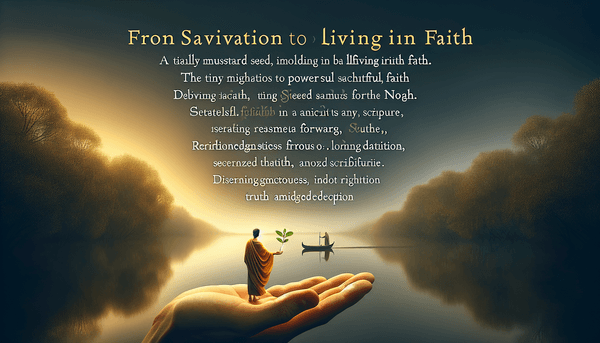Understanding Salvation as a Gift
The concept of salvation lies at the heart of Christian faith, encapsulated in Ephesians 2:8-9, which states, 'For by grace you have been saved through faith. And this is not your own doing; it is the gift of God, not a result of works, so that no one may boast.' Salvation is not something that can be earned or achieved through human effort; it is a divine gift of grace. Romans 6:23 echoes this sentiment, reminding us that 'the wages of sin is death, but the free gift of God is eternal life in Christ Jesus our Lord.' As Titus 3:5 asserts, our salvation is not due to righteous deeds but is accorded through God's mercy. This profound realization that belief in Jesus as portrayed in John 3:16 brings eternal life shifts the focus from self-reliance to trust in the divine. Acts 16:31 encapsulates the simplicity of the gospel: 'Believe in the Lord Jesus, and you will be saved.' It is through this faith that we receive the gift of salvation.
The Power of Faith
When it comes to faith, it is not the size but the strength and purity of our belief that matters. Jesus used the parable of the mustard seed to illustrate this point, as found in Matthew 17:20, where He says, '...if you have faith as small as a mustard seed, you can say to this mountain, 'Move from here to there,' and it will move. Nothing will be impossible for you.' This powerful metaphor highlights that even the tiniest grain of genuine faith has the potential to effect tremendous change. Luke 17:6 reinforces this idea, showing us that faith's potential is not limited by its initial size. The writer of Hebrews defines faith as 'the assurance of things hoped for, the conviction of things not seen' (Hebrews 11:1), suggesting that faith involves trust in God's promises and unseen realities. As 2 Corinthians 5:7 tells us, 'For we live by faith, not by sight.' This living faith is active, as James 2:17 reminds us that 'faith by itself, if it does not have works, is dead.' Our actions, therefore, should reflect this dynamic and living faith.
Embracing Change and Moving Forward
The scriptures offer profound wisdom on the necessity of letting go of the past and embracing the future with hope. Isaiah 43:18-19 encourages us to 'Forget the former things; do not dwell on the past. See, I am doing a new thing! Now it springs up; do you not perceive it? I am making a way in the wilderness and streams in the wasteland.' This passage invites us to trust in God's renewing work. Similarly, Philippians 3:13-14 urges us to leave behind what is past and press on toward the future: 'But one thing I do: Forgetting what is behind and straining toward what is ahead, I press on toward the goal to win the prize for which God has called me heavenward in Christ Jesus.' It's a reminder that in Christ, we are a new creation, as 2 Corinthians 5:17 declares, 'Therefore, if anyone is in Christ, the new creation has come: The old has gone, the new is here!' Embracing this new identity, we can move forward with the reassurance of Jeremiah 29:11 that God has plans to give us hope and a future, and with the daily renewal of His mercies as celebrated in Lamentations 3:22-23. For more insights on how to navigate life's challenges with biblical wisdom, visit our companion article.
The Deception of Satan as an 'Angel of Light'
One of the more sobering aspects of spiritual life is recognizing the reality of deception. The Bible warns that Satan often masquerades as an 'angel of light,' as mentioned in 2 Corinthians 11:14, to mislead the faithful. This metaphor serves as a stark reminder of the need for vigilance and discernment. In 1 Peter 5:8, believers are cautioned that 'the devil prowls around like a roaring lion looking for someone to devour.' Therefore, understanding his deceptive nature, as depicted in John 8:44 where he is called the 'father of lies,' is essential for spiritual awareness. To stand against such schemes, Ephesians 6:11 advises us to 'put on the full armor of God.' This defense includes truth, righteousness, faith, and the word of God, which serve as our protection. 1 John 4:1 further instructs us to 'test the spirits to see whether they are from God.' Thus, discerning truth from deception is crucial for maintaining a faithful walk with the Lord.
FAQ
Q: What does 'For by grace you have been saved through faith' mean?
A: This Bible verse from Ephesians 2:8-9 tells us that salvation is a gift from God that we receive through faith, not by our own efforts or good works.
Q: What does it mean to have faith like a mustard seed?
A: Having faith like a mustard seed refers to having a small but powerful faith. In the Bible, Jesus teaches that even faith as small as a mustard seed can lead to great outcomes because of its genuine and trusting nature.
Q: What does the Bible say about moving on?
A: The Bible encourages believers to let go of the past and move forward with hope in God, trusting that He is doing a new thing in their lives and making a way for them even in difficult circumstances.
Q: What was Noah like according to the Bible?
A: Noah, according to the Bible, was a righteous and obedient man who found favor in the eyes of God. He is described as a 'righteous man, blameless among the people of his time, and he walked faithfully with God' (Genesis 6:9).






